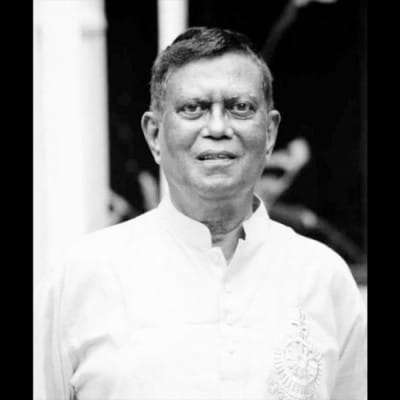Amir Ahmed Chowdhury: An unsung hero

I did not have many opportunities to meet Amir Ahmed Chowdhury personally, but I got to know about him from so many people that whenever we met it felt like we were close friends. He had this strong aura about him. And he was a man of empathy and action.
Amir Ahmed Chowdhury hailed from Feni. He came to Mymensingh with his father, where he got his school and college education and spent the rest of his life. Although life offered him many opportunities to settle elsewhere with better prospects, he had no interest in leaving. That was something rare in post-liberation Bangladesh where social mobility was high, urbanisation was booming and people were easily lured by better prospects. To move from a small town to the cities was the order of the day and success could be measured by one's mobility, which also included moving outside the country to the wider world.
In this backdrop, a small town did not have much to offer to a young man with diverse interests in art, culture and sports, especially as a keen player dedicated to the art of cricket. He completed his MA in history from Dhaka University in 1962 and occupied 9th place on the merit list, and had many opportunities opened in front of him. The Bengali national movement against disparity forced the Pakistani rulers to create more chances for the educated Bengali middle class and Amir Ahmed Chowdhury, popularly known as Ratan, had many to choose from. But he returned, not to his hometown Feni, where his family had a lot of property and fame; he returned instead to his adopted Mymensingh, a town vibrant with music, theatre, dance and the sports of hockey and cricket.
Repeated riots, especially the one in 1964 and the after-effects of the 1965 war with India had forced many eminent Hindus to migrate, leaving a void in the composite cultural life of Mymensingh. Panditpara Cricket Club with its colonial pavilion and large cricket field was still there and the team opening the game was a sight to enjoy. The eleven players dressed immaculately in white trousers and shirts, with their red ball shining and the matt laid out on the pitch was the epitome of the beauty of cricket. That was also a time of transition. The jute-made matt wicket was getting replaced by the hard pitch prepared by the groundsman.
Ratan Da returned to Mymensingh and engaged himself to retain and carry forward what was best there, the best in Bengal culture. He joined Gouripur College as a lecturer, not very far from Mymensingh, and considered teaching to be a passion, not a career. His other passions, sports and culture, drove him to various other work that he enjoyed. He established "Mukul Fouj", the juvenile organisation in 1969 and made it an active place for physical and cultural development of children. In 1970, he along with his friends, established "Mukul Niketan", an institution with an alternative educational approach. He was also active in many other ways. When a devastating cyclone hit the coastal area in 1970, he organised a large relief team and led them to provide succour to the people.
When the Pakistan Army launched their genocidal attack on the Bengali people, he organised local resistance. On March 25, when an attack was launched in Dhaka, Mymensingh was a free zone with the people and its local administration in control of the situation. He was among those who greeted Captain Nasim and his troops from the Bengal Regiment when they arrived in town by train from Joydevpur. As the stories of Pakistan's brutality reached the town, certain sections of the population became agitated and launched their attack against the Urdu-speaking community. During this troubled time, he saved the life of 16 Pathans, popularly known as Kabuliwala who frequented various places as small traders and money-lenders.
At one point he was picked up by the Pakistani Army and confined and tortured in the camp. He survived miraculously but others were not so lucky. His younger brother Captain Amin Ahmed Chowdhury joined the Liberation War and fought valiantly. The army raided their home at Feni and his octogenarian grandfather was brutally murdered along with six other family members. In the Pakistani camp, Amir Ahmed Chowdhury was about to be sent to the killing field but his life was saved by the same Kabulis whom he had once protected.
After independence Chowdhury devoted himself more to building the Mukul Niketan School and in 1983 left his job as principal of Gouripur College to be the headmaster of Mukul Niketan. Over the years the school inspired many teachers and raised generations of students imbued with humanist ideals and life-skills. The school has taken special steps to provide education to those coming from marginalised communities. The students of Mukul Niketan excelled in many ways. During the SAF Games held in Dhaka, students of Mukul Niketan dazzled the audience with their display and physical performance.
The philosophy that Amir Ahmed Chowdhury successfully put into practice was by providing education to develop the potential in every child and helping them to become good humans. He has shown us how one man's dedication and commitment can change many lives. Gradually he became Ratan Da to everyone in Mymensingh.
Amir Ahmed Chowdhury breathed his last on October 15, 2020. The coronavirus pandemic prevented many from paying him their last respects, but he remains engraved in many people's hearts as a man for all seasons, who stood by many people, assisting and guiding them in life. He was a man who found immense pleasure in offering his best for the development of the community—an unsung hero of Bangladesh.
Mofidul Hoque is a war crimes researcher and trustee of the Liberation War Museum.

 For all latest news, follow The Daily Star's Google News channel.
For all latest news, follow The Daily Star's Google News channel. 



Comments